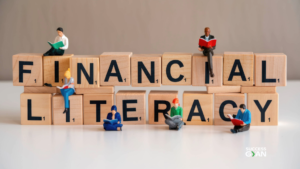

The Impact of Inflation on Financial Freedom

Picture a life of true financial freedom—where monetary worries dissolve into serenity, where pursuing your passions brings pure joy, and where peace of mind stretches endlessly into the horizon. Yet, lurking in the shadows is a relentless force that threatens this beautiful vision: inflation. While many simply see inflation as higher price tags at stores, its tendrils reach deeper into our financial lives than we imagine. Like a silent predator, inflation steadily erodes our savings, diminishes our investments, and jeopardizes our future security. It’s an invisible force that touches every aspect of our financial existence, making it crucial for anyone seeking true independence to understand its far-reaching impact.
Understanding Inflation: More Than Just Rising Prices
Financial freedom is more than accumulating wealth; it’s about having the resources to live life on your own terms, free from financial obligations.
Unfortunately, Inflation Can Disrupt This Journey In Several Ways:
Financial Literacy: Your Map to Navigate the Financial World
While savings accounts offer a haven of safety, they typically provide interest rates that struggle to match inflation’s pace. When inflation surges at 7% annually while your savings account yields only 4%, you’re watching 2% of your purchasing power vanish each year. This reality can crush the spirits of those who rely heavily on savings, particularly when inflation rates climb higher. The nest egg you built with care may no longer provide the security it once promised, and financial freedom begins to feel like a moving target.
Increased Cost of Living
As inflation pushes the costs of necessities—food, shelter, medical care, and schooling—ever higher, it affects not just our current expenses but demands we fortify ourselves against future needs. For anyone looking to retire early or pursue dreams without income-related worries, inflation means possibly delaying those aspirations or compromising on the quality of life envisioned.
Impact on Investment Returns
Countless individuals turn to investments as their pathway to future wealth. Although certain assets like stocks, property, or bonds provide some shield against inflation, not every investment thrives during inflationary times. Consider bonds, which offer fixed returns that may crumble as inflation rises. Even the stock market isn’t immune to inflation’s touch—its instability during such periods makes it an unreliable foundation for those who depend solely upon it. The journey to financial freedom demands a carefully crafted investment strategy to ensure returns stay ahead of inflation’s relentless march.
Reduced Purchasing Power in Retirement
The dream of financial freedom often includes a peaceful retirement, yet inflation can mercilessly erode purchasing power as years pass. Retirees, who’ve dedicated their lives to building their financial cushion, often face inflation’s cruelest effects. Escalating costs might force them into painful choices: abandoning cherished travel plans, reducing medical care, or accepting a diminished lifestyle they never imagined. This becomes particularly heart-wrenching as healthcare expenses—a major retirement cost—frequently rise faster than general inflation, placing extra strain on retirement savings.
The Hidden Psychological Burden of Inflation on Financial Well-being
True financial freedom transcends mere numbers—it’s about achieving inner tranquility. The unpredictable nature of inflation can breed anxiety and uncertainty, particularly for those who’ve spent years building their path to financial independence. Witnessing savings slowly deteriorate or adapting lifestyle choices to combat inflation can inflict deep emotional wounds.
This psychological impact often goes unrecognized yet deserves attention. The quest for financial freedom requires emotional strength and unwavering conviction, and inflation’s constant pressure can make even the most meticulously planned financial strategies feel precarious. The knowledge that today’s financial stability might not withstand future inflation can trigger a spiral of concern and adaptation, diminishing the very sense of freedom we strive to achieve.
How Inflation Challenges Different Aspects of Financial Planning
The far-reaching effects of inflation mean that almost every financial decision is affected in some way.
Let’s explore how inflation influences various aspects of financial planning:
Savings and Emergency Funds
Building a robust savings account or emergency fund stands as a cornerstone of financial security. Yet, in our low-interest environment, conventional savings accounts regularly fall behind inflation’s pace. This means your $10,000 safety net today might only wield the buying power of $9,000 in the coming years. Without active measures to combat inflation, even the most carefully constructed financial safeguards can weaken over time.
Debt Repayment
Inflation presents a complex scenario for those carrying debt. While it reduces the actual value of fixed-rate debts as time passes, it simultaneously drives up variable interest rates and complicates the management of new borrowing. Consequently, high inflation can complicate the debt repayment journey, especially if you depend on loans to realize major life aspirations, such as homeownership or educational advancement.
Cost of Future Goals
Planning future goals becomes increasingly challenging under inflation’s shadow. Whether you’re saving to give your child the best education, planning that dream vacation, or preparing to turn your business vision into reality, rising costs demand that your financial goals grow too. If you don’t account for inflation, the future you’ve worked so hard to build could slowly drift out of reach.
Strategies to Shield Financial Freedom from Inflation
Inflation, while inevitable, doesn’t have to derail financial freedom. By understanding its effects and implementing smart strategies, individuals can protect their wealth and stay on track toward financial independence. Here are some steps to consider:
Invest in Inflation-Resistant Assets
Certain assets have the potential to hold or even gain value during inflation, including:
Real Estate: Property prices typically rise with inflation, making real estate a strong choice for securing long-term wealth.
Commodities: Precious metals like gold and silver, along with oil, often act as inflation hedges, rising in value when prices climb.
Stocks: Many companies adjust their prices to keep pace with inflation, safeguarding stock investments. Diversifying into resilient sectors, like consumer staples and energy, can offer additional security.
By including inflation-resistant assets in your portfolio, you create a financial shield that helps safeguard your purchasing power as living costs rise.
Prioritize Income-Generating Investments
Investing in income-generating assets like dividend stocks or rental properties can provide a steady cash flow that adapts to inflation. A reliable income stream isn’t just comforting—it’s a necessity for maintaining financial stability as costs continue to climb.
Build an Emergency Fund with Growth Potential
A portion of your emergency fund can be placed in inflation-resistant assets, such as short-term bonds or high-yield savings accounts. While liquidity is key, allowing part of your savings to earn a modest return can help counteract inflation and preserve your financial security.

Review and Adjust Your Budget Regularly
As the cost of living shifts, so should your budget. This doesn’t mean cutting out the things that bring you joy—it means making intentional choices that align with what truly matters. Adjusting discretionary spending ensures your financial goals stay on track without sacrificing your quality of life.
Consider Inflation-Indexed Bonds
Treasury Inflation-Protected Securities (TIPS) are government bonds specifically designed to rise in value alongside inflation. Including TIPS in your portfolio offers not just financial protection, but peace of mind—providing stability and steady returns with minimal market risk.
Stay Educated and Agile
Inflation is not a fixed rate; it fluctuates based on various factors like economic policies, global events, and market dynamics. By staying informed about inflation trends and understanding what drives them, you’ll be in a better position to make proactive financial decisions. This might mean adjusting investments, reevaluating savings strategies, or exploring new income sources as needed.
Increase Your Earning Potential
One of the best ways to counter inflation is to increase your income. Whether it’s through upskilling, pursuing side businesses, or negotiating raises, finding ways to grow your earnings can help ensure that your financial progress keeps pace with rising costs. By continuously investing in your earning potential, you create a hedge against inflation that’s under your control.
Building a Resilient Path to Financial Freedom in an Inflationary World
Inflation doesn’t have to be a barrier to financial freedom, but it does require foresight and flexibility. Achieving financial independence in an inflationary world is about embracing a mindset of resilience and adaptability. It’s about crafting a financial strategy that acknowledges inflation as a reality, not an obstacle.
By focusing on sustainable growth, diversified investments, and continuous income generation, it’s possible to build a life that remains secure and fulfilling, even as the economy fluctuates. Financial freedom in an inflationary world isn’t a one-time achievement; it’s an ongoing journey that requires attention, planning, and adjustments along the way.
Conclusion!
Ultimately, financial freedom is more than wealth—it’s about peace of mind and the ability to live life on your own terms. Inflation can challenge this vision, but it can also push us to make smarter financial choices and develop a mindset of resilience.
With the right strategies, inflation becomes less of a looming threat and more of a manageable challenge. Achieving financial freedom means understanding that our control lies not in avoiding economic changes but in preparing for them. When we build our financial lives with resilience and adaptability, we create a future that can withstand inflation’s impact and endure the test of time.
Financial freedom, when built on a strong foundation, is not easily swayed by economic changes. By understanding the true impact of inflation and taking proactive steps to counter it, we empower ourselves to live a life that’s financially secure, balanced, and aligned with our goals. In a world where inflation is inevitable, resilience becomes the key to true financial independence.
That’s where programs like the Millennium Mind Intensive from Success Gyan can make all the difference. But there is hope. With the right knowledge, tools, and unshakable resilience, it’s possible not just to endure economic uncertainties but to rise above them, to thrive in ways that inspire others.
FAQs for the impact of inflation on financial freedom
Inflation reduces the purchasing power of your money, which affects financial freedom by eroding savings and making essential expenses costlier. It’s crucial to adopt strategies like inflation-proofing financial freedom through diversified investments and income-generating assets to protect wealth against inflation and ensure long-term financial independence.
Inflation impacts financial statements by lowering real asset values and increasing liabilities, affecting overall financial health. Managing financial freedom during inflation involves regularly adjusting financial goals and using inflation strategies for financial independence, like investing in assets that appreciate with inflation, to preserve the value of financial statements.
Inflation affects savings, investments, and everyday costs, posing challenges to building wealth amidst inflation. To counteract the effects of inflation on savings, prioritize inflation-resistant investments, like real estate and commodities, which help protect financial freedom and enable individuals to continue growing wealth despite inflationary pressures.
Inflation creates volatility in financial markets, often leading to shifts in stock prices and bond yields. Knowing how inflation impacts investments helps investors adapt. Inflation strategies for financial independence include diversifying assets and focusing on sectors resilient to inflation, which can protect and grow wealth during uncertain market conditions.
Inflation reduces the purchasing power of your money, which affects financial freedom by eroding savings and making essential expenses costlier. It’s crucial to adopt strategies like inflation-proofing financial freedom through diversified investments and income-generating assets to protect wealth against inflation and ensure long-term financial independence.
Inflation impacts financial statements by lowering real asset values and increasing liabilities, affecting overall financial health. Managing financial freedom during inflation involves regularly adjusting financial goals and using inflation strategies for financial independence, like investing in assets that appreciate with inflation, to preserve the value of financial statements.
Inflation affects savings, investments, and everyday costs, posing challenges to building wealth amidst inflation. To counteract the effects of inflation on savings, prioritize inflation-resistant investments, like real estate and commodities, which help protect financial freedom and enable individuals to continue growing wealth despite inflationary pressures.
Inflation creates volatility in financial markets, often leading to shifts in stock prices and bond yields. Knowing how inflation impacts investments helps investors adapt. Inflation strategies for financial independence include diversifying assets and focusing on sectors resilient to inflation, which can protect and grow wealth during uncertain market conditions.

Millionaire Mind Intensive is about unlocking your financial freedom and strengthening your relationship with money.
Quick Links
Contact Info
Success Gyan India LLP
S5, Thiru Vi Ka Industrial Estate,
Guindy, Chennai – 600032







